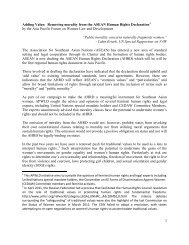A Digest of Case Law on the Human Rights of Women - Asia Pacific ...
A Digest of Case Law on the Human Rights of Women - Asia Pacific ...
A Digest of Case Law on the Human Rights of Women - Asia Pacific ...
Create successful ePaper yourself
Turn your PDF publications into a flip-book with our unique Google optimized e-Paper software.
The resp<strong>on</strong>dent argued argued that Jesmin Jesmin Sultana Sultana had had voluntarily voluntarily left left his his house house and<br />
and<br />
was residing with her parents without lawful cause, and <strong>the</strong>refore was not entitled to<br />
maintenance. He relied up<strong>on</strong> a precedent established in Mosammat Nur Akhter v Md.<br />
Abdul Mabud Chowdhury (1996) 16 BLD 396 in which <strong>the</strong> he petiti<strong>on</strong>er was held not to<br />
be entitled to maintenance because she had voluntarily left her husband.<br />
Decisi<strong>on</strong><br />
The Supreme Court decided in favour <str<strong>on</strong>g>of</str<strong>on</strong>g> Jesmin Sultana and restored <strong>the</strong> original<br />
amount <str<strong>on</strong>g>of</str<strong>on</strong>g> prompt dower <strong>on</strong> <strong>the</strong> basis that she was compelled to leave <strong>the</strong> marital<br />
home because <str<strong>on</strong>g>of</str<strong>on</strong>g> her husband’s applicati<strong>on</strong> to take a sec<strong>on</strong>d wife. His applicati<strong>on</strong> for<br />
a sec<strong>on</strong>d wife was based <strong>on</strong> <strong>the</strong> fact that <strong>the</strong> petiti<strong>on</strong>er was sickly and incapable <str<strong>on</strong>g>of</str<strong>on</strong>g><br />
performing c<strong>on</strong>jugal relati<strong>on</strong>s. The Court held that a husband will <strong>on</strong>ly be released<br />
from an obligati<strong>on</strong> to pay <strong>the</strong> prompt dower in full if a wife voluntarily remits part <str<strong>on</strong>g>of</str<strong>on</strong>g><br />
<strong>the</strong> dower. It reaffirmed Jesmin Sultana’s right to maintenance as fixed by <strong>the</strong> lower<br />
court at 500 taka per m<strong>on</strong>th.<br />
The Court noted, although not as part <str<strong>on</strong>g>of</str<strong>on</strong>g> <strong>the</strong> binding decisi<strong>on</strong>, that secti<strong>on</strong> 6 <str<strong>on</strong>g>of</str<strong>on</strong>g> <strong>the</strong><br />
Muslim Family <str<strong>on</strong>g>Law</str<strong>on</strong>g>s Ordinance 1961, which permits polygamy, is c<strong>on</strong>trary to<br />
Islamic law. It c<strong>on</strong>cluded, based <strong>on</strong> a variety <str<strong>on</strong>g>of</str<strong>on</strong>g> commentators, that Islamic law<br />
holds that in order to practice polygamy a husband must be able to deal “justly”<br />
with all his wives. The Court agreed with Muslim jurists and scholars who take<br />
<strong>the</strong> view that in <strong>the</strong> c<strong>on</strong>text <str<strong>on</strong>g>of</str<strong>on</strong>g> modern society it is impossible to deal with multiple<br />
wives “justly” and <strong>the</strong>refore Islamic law in effect prohibits taking a sec<strong>on</strong>d wife<br />
during an existing marriage. The Court recommended that secti<strong>on</strong> 6 <str<strong>on</strong>g>of</str<strong>on</strong>g> <strong>the</strong> Muslim<br />
Family <str<strong>on</strong>g>Law</str<strong>on</strong>g>s Ordinance 1961 be repealed and substituted with a secti<strong>on</strong> prohibiting<br />
polygamy.<br />
Commentary<br />
The matter before <strong>the</strong> Court did not require a ruling <strong>on</strong> <strong>the</strong> legality <str<strong>on</strong>g>of</str<strong>on</strong>g> polygamy,<br />
however <strong>the</strong> Court took it up<strong>on</strong> itself to state its opini<strong>on</strong> <strong>on</strong> <strong>the</strong> matter. Its statement,<br />
and ensuing recommendati<strong>on</strong>, that <strong>the</strong> practice <str<strong>on</strong>g>of</str<strong>on</strong>g> polygamy is c<strong>on</strong>trary to Islamic<br />
law is positive for women. The judges in <strong>the</strong>ir discussi<strong>on</strong> <str<strong>on</strong>g>of</str<strong>on</strong>g> <strong>the</strong> Qu-ran and Sunnah<br />
interpreted <strong>the</strong> issue <str<strong>on</strong>g>of</str<strong>on</strong>g> polygamy from a broad perspective, using <strong>the</strong> opini<strong>on</strong> <str<strong>on</strong>g>of</str<strong>on</strong>g><br />
jurists and <strong>the</strong> laws <str<strong>on</strong>g>of</str<strong>on</strong>g> o<strong>the</strong>r Islamic countries (e.g. <strong>the</strong> Tunisian <str<strong>on</strong>g>Law</str<strong>on</strong>g> <str<strong>on</strong>g>of</str<strong>on</strong>g> Pers<strong>on</strong>al<br />
Status 1957, which prohibits <strong>the</strong> practice <str<strong>on</strong>g>of</str<strong>on</strong>g> polygamy). They argued against<br />
<strong>the</strong> present law <strong>on</strong> polygamy <strong>on</strong> <strong>the</strong> basis that it is c<strong>on</strong>trary to <strong>the</strong> principles and<br />
present practice <str<strong>on</strong>g>of</str<strong>on</strong>g> Islamic law. The positi<strong>on</strong> <str<strong>on</strong>g>of</str<strong>on</strong>g> <strong>the</strong> Court will provide a valuable<br />
springboard for fur<strong>the</strong>r jurisprudential discussi<strong>on</strong> and advocacy by women’s groups<br />
and activists.<br />
75<br />
Jesmin Sultana v Mohammad Elias (Bangladesh)



